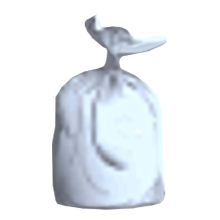Scams are schemes which try to get you to part with your money or personal information by deceiving you, without providing anything of value in return. Scammers have one purpose and one purpose alone and that is to get hold of your money and details.
Friends Against Scams Training
Online training is available for anyone wishing to avoid scams, help others avoid scams, recognise people who may have become victims and help people who have already lost money. The training is provided by the National Trading Standards Scams Team and is available through this link. More information is available from the Friends Against Scams website. Lapel pins are available for anyone who takes the training, contact Guernsey Trading Standards after you've completed the training using the contact details on this page.
We have also produced a Guernsey copy of the "Little Book of Big Scams" which has lots of examples of common scams and advice on how to protect yourself. Follow the link to download a copy or pick one up from Trading Standards at Raymond Falla House, Longue Rue, St Martin's.
Guernsey Trading Standards can also offer this training as a presentation to community or business groups at no charge. Contact Guernsey Trading Standards if you wish to discuss this
What do we mean by "scam"?
- When we talk about scams it goes much further than sharp business practice or bad service when things go wrong. Scammers never want to give you anything valuable, if they do give anything it is likely to be worthless and is only meant to keep you on the hook so they can get more money from you, or it will be vastly over-priced.
- Scams can cover any trade and take many forms. The scammers might try to offer you all sorts of things from miracle cures to get rich quick schemes. Scams can be initiated by post, emails, telephone calls or even a knock at the door. Scammers will pretend to be your friend, or sometimes threaten you with legal action, sometimes scammers will be aggressive. They will do anything to get your money and behave however they think will be most effective.
- The scammers may use high pressure sales tactics, verging on harassment, to try to get you to sign up to a contract for something you don't need and have no use for, or they might simply try to steal your bank details so that they can access your account.
What can the effect of scams be?
- Scams can be extremely damaging to their victims. Of course there's the financial damage and people can lose tens of thousands of pounds. Some people can also end up borrowing money from friends and family or take out loans to pay the scammers and then feel guilty when they can't pay them back.
- Unfortunately it is very rare to get your money back after you've been scammed but Trading Standards can advise you on how to avoid scammers and scams in the first place.
- Often, people who've been scammed don't report it because they're too embarrassed, but this only encourages the scammers because they think they can get away with it. Trading Standards offers impartial, confidential advice.You can contact us by emailing scams@gov.gg, calling us on T: (01481) 220379 or writing to us, or you can visit us in person (please see our address and contact details at the bottom of the page, if you wish to visit in person please phone first to make sure someone is available to speak with you).
- If you need to report a scam rather than just need advice then call Guernsey Police on T: (01481) 725111 or email fraud@guernsey.pnn.police.uk
- During July we will be out in the community providing advice and support to anyone who needs it. While we may not be able to get money back in all cases, what you tell us can help us to target resources locally, nationally and internationally.
- If you think you've been targeted by scammers over weeks, months, or even years there is help available. Call Trading Standards on T: (01481) 220379 for free, impartial, confidential advice.
How can you protect yourself from scams?
- Sign up to the Telephone Preference Service and the Mail Preference Service. These are free services which allow you to opt out of unwanted marketing. They shouldn't stop any catalogues that you usually use but they prevent legitimate businesses from contacting you out of the blue to try to sell to you. Once signed up any un requested telesales calls and addressed sales post you receive can be safely ignored. These services will never contact you asking for payment.
- · Stop and think! Take advice from informed relatives and friends that you've known for some time. Scammers know that if you have time to think you would probably recognise a scam, so don't get pushed into making a decision quickly.
- · If it sounds too good to be true then it probably is! For example you cannot win a lottery if you have not bought a ticket for it!
- · Talk to family and friends. Don't hide from friends or family the fact that you've paid out money, even if the person you're dealing with says you should. Many people can get sucked into spending thousands of pounds because they don't feel they can tell their family what's happening but this just plays into the scammers' hands.
Recognising and protecting yourself from scams
- Before parting with money or personal information, stop and think:
- 1. Did they contact you out of the blue?
- 2. Does it seem too good to be true?
- 3. Take a step back: If it happened to your friend would you tell them it was a scam?
- 4. Take time and seek advice from family and friends, or from Trading Standards. Offering a 'special price' that's only available for a limited time is a favourite trick of scammers designed to stop you from properly considering an offer. Even if it seems like an amazing offer you should always take the time to think about it and get advice.
- 5. Do you have to pay fees, taxes or other charges for a prize or 'free' gift?
- 6. Do you have to ring a premium rate number? (one starting with '09')
- 7. Have you been offered what seems like a fantastic deal, but only if you accept it immediately?
- 8. Is the business reluctant to give you its address or contact details?
- 9. Are you being asked to keep the offer confidential?
- 10. Be skeptical - especially before signing anything or handing over any money.
- And finally, if you have any queries, questions or think you may have been contacted by a scammer contact Trading Standards using the details provided in the box below.
Scams Currently Active in Guernsey
The scams below are currently targeting islanders and have all been reported to Trading Standards recently. If you experience these or any other scams then please report them to Trading Standards.
These aren't the only scams that you might come across. Bear in mind that there are thousands of scams operating all the time and below is just a small sample of scams which are common in the Islands at the moment
Holiday clubs
- You receive a telephone call or are approached by someone at a foreign airport call offering very cheap or even free holidays, you just have to attend an hours presentation while you are there. When you arrive and go to the presentation you are not allowed to leave until you have signed up to a holiday club or other package that costs many thousands of pounds. If you try to leave the presentation you may be threatened with being forced to pay the full cost of your cheap holiday since you didn't keep your end of the bargain.
- What should I do I do if I am targeted? Think hard before you accept a free or cheap holiday, it may be better to go to a reputable travel agent to see if they can get you a similarly cheap deal. If you do find yourself in a presentation that lasts for hours then stand firm. If they said that it would last an hour then leave after an hour.
- What if I've given money back for an overpayment? Some of these schemes are legal, some are illegal and some are in a gray area. Keep all of your paperwork and call Trading Standards on (01481) 234567 for advice. Don't sign any further "deals" no matter how much you are pushed into doing so and beware of companies offering to get you out of deals or get you a refund since some of these may also be scams.
Fake hotel bookings
- This scam tends to target businesses rather than individuals. You receive a booking from someone travelling on business. The potential guest has to sent a cheque for more than the cost of the booking, usually because his company only give a single cheque for the total cost of travel. The guest asks you to cash the cheque and reimburse them with the difference and, happy to help a paying guest, you oblige. Later the cheque bounces and you can't contact your guest, you've not only lost a booking but also the money you paid to the 'guest'.
- What should I do I do if I am targeted? Never accept an overpayment. If the guest is genuine they will be able to pay you the proper amount. You can still report it to Trading Standards even if were not taken in.
- What if I've given money back for an overpayment? Call your bank IMMEDIATELY to try and stop the payment. Call Guernsey Police on T: (01481) 725111, the quicker you report it the more likely stolen money can be retrieved. Report it to Trading Standards.
Vishing scam - Phone call from someone pretending to be your bank
- You receive a call from someone claiming to be from your bank. They may ask you to call the bank using the number on the back of your card to reassure you that you are speaking to your bank, but in reality they keep the line open. This means, when you think you have called your bank back you are still speaking to the scammers. They then persuade you to give them detailed account information allowing them to take your money.
- What should I do I do if I am called? Put the phone down, call your bank using a different phone (a mobile or your neighbour's phone) or wait 20 minutes before calling the bank using your phone.
- What if I've given my details to a scammer? Call your bank IMMEDIATELY using a different phone so that they can stop any transactions. Call Guernsey Police on T: (01481) 725111, the quicker you report it the more likely stolen money can be retrieved.
Doorstep cold calling
- Workmen knock on your door claiming to be carrying out work in the area or on a neighbour's property. They may try to build up a relationship with you first before noticing something wrong with your property, or having left over materials from another job. They offer to tarmac your driveway, fix your roof or do some other job. Often the workmen are not local and will leave the island soon after, leaving you with no way of sorting out problems with unfinished or substandard work.
- What should I do if I've been called? The workmen are on YOUR property and you should feel confident to say no. You are not being rude if you ask them to leave, you are just declining their offer. If you want the work to be carried out then talk to friends and family to see if they can recommend a workman. We are not suggesting that all non-local workmen are scammers, but if you decide to hire one make sure that you have their full address so that you can sort out any problems. If the work costs between £100 and £30,000 then pay by credit card as this gives you additional protection. IF THE WORKMEN BECOME AGGRESSIVE AND YOU FEEL UNDER THREAT AT ANY TIME THEN CALL 999.
- What should I do if I've had problems with a cold calling builder? If the builder is still around ask them to fix the problem. You shouldn't pay the full cost until the work is finished and properly done. Call Trading Standards on T: (01481) 234567 for free, impartial, confidential advice. Whether you have had trouble or not you can ask Trading Standards for a "NO COLD CALLING" sticker pack. This contains a sticker that you can put on your front door to deter cold callers.
Salesmen scams
- You are offered a free demonstration of a product in your home, for instance a free professional cleaner or free carpet shampoo. When the trader turns up they are actually a salesman. They do very little of the promised work and stay in your home for hours until you agree to buy their product. Some people agree to buy expensive items worth thousands just to get the salesman to leave. The price is highly inflated so they can offer large discounts while still charging much more than you would usually pay.
- What should I do if I've been offered this service? Consider if you actually want the product they are offering, if not don't let them in your house. Make sure you have a friend with you to support you. Feel free to say no at any time and ask them to leave, it's not rude to ask someone to go. If it's a product that you want then shop around for the best price. If you've asked a salesman to leave and he refuses, or if you feel threatened, dial 999.
- What should I do if I've had problems with pushy salesmen?Call Trading Standards on T: (01481) 234567 for free, impartial, confidential advice.
Computer engineer scam
- You are called by someone claiming to work for Microsoft. They may claim to be from;Windows Helpdesk; Windows Service Centre; Microsoft Tech Support; Microsoft Support; Windows Technical Department Support Group; Microsoft Research and Development Team, in reality they are criminals with no connection to Microsoft whatsoever. They say that they have detected that you have a problem with your computer, usually a virus, making it run slow. They then offer to access your computer remotely and fix it for a fee. If you refuse they may try to scare you, suggesting that you are committing a crime by not letting them fix it or that your computer will be disabled.
- What should I do I do if I am called? Put the phone down without saying anything to them. If they call back then leave the phone off the hook for a few minutes. They may call again the next day, but they should give up if you ignore them. If you are worried about your computer take it to a reputable local computer engineer.
- What if I've given money to a scammer or let him access my computer? If you've paid by credit card you may be able to get your money back under Section 75 of the Consumer Credit Act so get in touch with your credit card company. If you've paid by debit card or bank transfer then contact your bank immediately since they may be able to stop the payment. If you've allowed the scammer to access your computer then they may have installed software which can steal your passwords or use your computer for criminal activities, get your computer checked out by a reputable local computer engineer. Call Trading Standards on T: (01481) 234567 for free, impartial, confidential advice. Microsoft have advice on avoiding scams on their website.













